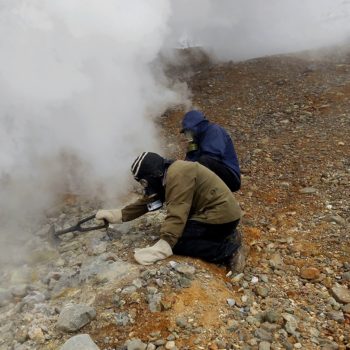Why We Love It
-
$77,190Potential Avg. Salary
-
-0.5%Job Growth Rate
-
Flexible HoursCareer Attribute
-
High Income PotentialCareer Attribute
A phycologist is a biological scientist that takes on the study of algae and phytoplankton, as a sub-discipline of botany.
Recommended Schools
What is a Phycologist?
Duties
A phycologist executes the following duties:
- Undertake extensive experiments to gain insights on the properties of algae, where it is frequently found and how it interacts with different environments.
- Go on expeditions to remote locations with the purpose of collecting algae samples and study them to assess their role in the surrounding ecosystem.
- Conduct experiments with different algae in controlled laboratories for further research.
Day In The Life
A phycologist spends most his or her days working on research, teaching and sharing their findings with academic audiences. Research can involve collecting specimens, building theoretical knowledge in biochemistry and biology and keeping detailed records of research. The best part about working in this profession is the ability to combine field work with laboratory experiments. You may travel quite often between a recently discovered field site and your lab to further your understanding of algae. For example, you might conduct experiments to figure out how varied types of algae react to changes in environmental conditions or to further comprehend the molecular makeup of algae.
To successfully publish your findings, you must have collected an entire set of data and organised it into a report format that is edited according to journal guidelines. You may also be invited to speaking engagements based on your written work and take part in panel discussions or seminars. If you are also teaching at an academic institution, you will be spending your day in classrooms and grading homework assignments while balancing your research on the side.
Work Schedule
Phycologists are usually employed full-time by private research institutes or academic institutions. You would be working in a standard office environment and making occasional trips outdoors to specific locations like rivers, oceans and lakes for collecting data.
Growth Of The Job
Job growth in this sector is projected to increase at a rate similar to other professions by 2020. With sufficient work experience, you could gain a research position at a well-recognised college or university. Alternatively, you may choose to pursue your career at agribusiness companies or water treatment facilities to contribute to ground-breaking research such as extracting renewable energy from algae or creating innovative foods. In recent times, there is increased focus on the nutritional benefits of algae and seaweed which has brought about the popularity of macro-algae farms where phycologists are in demand. Moreover, senior phycologists often become consultants on a particular project or grant for government agencies, pharmaceutical companies and other research firms.
Typical Employers
Pharmaceutical companies, government agencies and law firms are potential employers of phycologists and provide them with consulting opportunities on certain grants or projects. As more qualified applicants try for jobs in the field, there will be greater competition that is hoping to get government funding for continuing their research. Job growth in the physical and life sciences are projected to increase at a rate equivalent to the average for all professions, until 2020. Those possessing a Ph.D. and extensive academic publishing experience will have the most opportunities for funded research projects and potential faculty positions in academia.
Recommended Schools
How To Become a Phycologist
You must have a master’s degree to pursue a career as a phycologist, while certain specialised positions require a Ph.D. If you want to get a head-start with your experience, you could complete an internship in biology or phycology to gain valuable experience working in the field while still in school. Your coursework should be in phycology, botany or marine biology. Most such programs help students to get a grasp regarding the ways in which you must accumulate and analyse knowledge in a scientific profession.
Phycologists must also have valued skills like critical thinking, mathematics, critical thinking, speaking and writing. In this profession, you must be adept at operating a wide range of scientific equipment, which includes binocular light compound microscopes, spectrometers, centrifuges, lasers, light scattering equipment and more. Since you will be using various software to analyse your findings, familiarity with analytical, photo imaging and graphic applications is a must.
If you are someone that enjoys intensive research, long hours of field work and writing out reports, this career is an excellent choice. While continuing education is not necessary on this career path, phycologists can benefit from doing so throughout their careers to remain on track regarding new advances in the field.
Phycologist Salary Data
We’ve provided you the following to learn more about this career. The salary and growth data on this page comes from recently published Bureau of Labor Statistics data while the recommendations and editorial content are based on our research.
National Anual Salary
Low Range
$57,160Average
$77,190High Range
$112,820National Hourly Wage
Low Range
$27/hrAverage
$37/hrHigh Range
$54/hrHow do Phycologist salaries stack up to other jobs across the country? Based on the latest jobs data nationwide, Phycologist's can make an average annual salary of $77,190, or $37 per hour. On the lower end, they can make $57,160 or $27 per hour, perhaps when just starting out or based on the state you live in.
Salary Rankings And Facts
#156 Nationally for All Careers
Above Average Salary Nationally
Programs and Degrees
Here are the most common degrees for becoming a Phycologist. a is usually recommended and specifically a degree or coursework that prepares you for the particular field, see below.
Highest Education Among Phycologists
- 19.6% Doctorate
- 32% Masters
- 43.8% Bachelors
- 2.2% Associates
- 2.1% College
- 0.2% High School
- 0.1% Less than High School
Job Growth Projections and Forecast
2014 Total Jobs
36,4002024 Est. Jobs
36,200Job Growth Rate
-0.5%Est. New Jobs
-200How does Phycologist job growth stack up to other jobs across the country? By 2024, there will be a change of -200 jobs for a total of 36,200 people employed in the career nationwide. This is a -0.5% change in growth over the next ten years, giving the career a growth rate nationwide of Above Average.
Growth Rankings And Facts
#626 Nationally for All Careers
Above Avg. Growth Nationally
What Companies Employ The Most Phycologists
| Industry | Current Jobs | New Jobs Needed | % Increase |
|---|---|---|---|
| Federal government, excluding postal service | 17,600 | -1,700 | -2% |
| Research and development in the physical, engineering, and life sciences | 5,800 | 400 | 0% |
| Colleges, universities, and professional schools; state | 5,300 | 200 | 0% |













